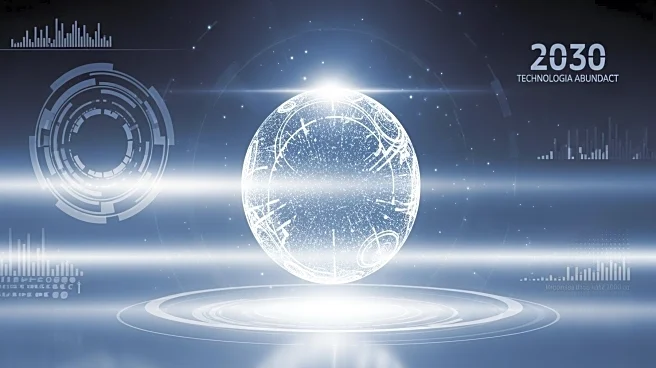What's Happening?
Ray Kurzweil, a renowned futurist and Google's Director of Engineering, has made a bold prediction that by 2030, humanity could experience an era of abundance driven by technological advancements. In his
latest book, 'The Singularity Is Nearer,' Kurzweil extends his previous forecasts, suggesting that artificial intelligence will surpass human intelligence by 2045, fundamentally transforming civilization. He envisions a future where nanotechnology and biology merge, allowing for direct brain-to-cloud connections, which could revolutionize learning and creativity. Kurzweil's predictions include digital immortality, medical nanobots, and abundant clean energy, all contributing to a more comfortable and accessible lifestyle for many.
Why It's Important?
Kurzweil's predictions, if realized, could have profound implications for society, potentially reshaping industries, healthcare, and daily life. The integration of AI and biotechnology could lead to significant advancements in medical treatments, energy production, and knowledge access, potentially reducing costs and increasing accessibility. However, these developments also raise ethical and social concerns, such as the potential for increased inequality if only a privileged few can afford these technologies. The debate over the timeline and feasibility of such advancements continues, with some experts, like Meta's AI chief Yann LeCun, expressing skepticism about the near-term realization of human-level AI.
What's Next?
As the 2030s approach, the pace of technological innovation is expected to accelerate, prompting discussions on policy and regulation to ensure equitable access and address ethical concerns. Stakeholders, including policymakers, businesses, and civil society, will need to navigate the challenges and opportunities presented by these advancements. The focus will likely be on establishing safety standards, data rights, and equitable access to prevent widening social inequalities. Kurzweil's vision challenges society to rethink the future of humanity and the role of technology as a partner rather than a rival.
Beyond the Headlines
Kurzweil's predictions highlight the potential for technology to address global challenges, such as healthcare and climate change, more effectively. However, the ethical implications of such advancements, including the potential for digital immortality and enhanced intelligence, require careful consideration. The societal impact of these technologies will depend on how they are implemented and regulated, with the potential to either bridge or widen existing inequalities.










